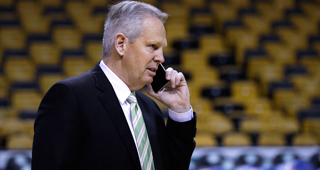Much has been made of Danny Ainge’s asset hoarding, but his best work the last two summers has come in free agency. Just a year after signing Al Horford to a four-year, $113 million deal, the Celtics made an even more consequential move by agreeing to a four-year, $128 million contract with Gordon Hayward.
Hayward is a more meaningful signing for the Celtics in a variety of ways -- he’s three years younger than Horford was last July, he’ll make a bigger offensive impact, and the situation with the Jazz was harder to leave than the one Horford left with the Hawks.
The immediate fallout from Hayward’s decision will involve the Celtics clearing the necessary cap space to make things official. They renounced Kelly Olynyk and will have to trade Jae Crowder, Avery Bradley or Marcus Smart. Brad Stevens can always go small, but things will be crowded on the wing with Bradley, Crowder, Hayward, Jaylen Brown, and Jayson Tatum.
For that reason, opting to trade Crowder would accomplish two things at once. It also makes you wonder if Ainge would have held onto the first overall pick and taken Markelle Fultz last month if he knew Hayward would definitely sign. Tatum is one of the most NBA-ready lottery picks, but there may not be too many minutes to go around with six players for essentially two positions. If he isn’t the cap casualty, Crowder can play power forward against certain opponents to allow Boston to play small.
Hayward wrote in his Players’ Tribune piece that he valued the winning culture in Boston, the amazing potential of the roster, and getting a chance to rectify “unfinished business” with Stevens, under whom he played at Butler.
Ainge has spent the last several years accumulating assets and placing high value on them in trade talks. Over the past five months, it seems certain that he could have added either Jimmy Butler or Paul George in a trade if he was willing to cash in some of those chips. He might have had to go over market value to do so, but no one would have faulted him. Instead, he settled for using his cap flexibility to sign Hayward as he did a year ago with Horford. It’s impressive that his two most substantial moves post-Brooklyn trade have come in free agency.
Admittedly, I’ve been advocating for the Celtics to go for it for quite some time, but Ainge’s patience has paid off tremendously.
The Eastern Conference has been further decimated this offseason with Butler dealt to Minnesota, and George now with Russell Westbrook in Oklahoma City. The Toronto Raptors will be good, but another year older with a weaker core than last year. The Washington Wizards still have John Wall and Bradley Beal, and an expensive decision to make on Otto Porter. The Milwaukee Bucks will have the best player in the conference if LeBron James goes West next summer, but they still might be years from reaching their Giannis Antetokounmpo-Jabari Parker potential.
The Atlanta Hawks, Pacers and Bulls are all firmly in rebuild mode, which leaves the Cleveland Cavaliers as the only thing standing in the way of the Celtics and the NBA Finals.
Can a Big 3 of Isaiah Thomas, Hayward and Horford beat LeBron James, Kyrie Irving and Kevin Love? It’s not unfathomable, but the divide between Boston and Cleveland was vast in May. Its doubtful Hayward alone can vault the Celtics past the conference finals next year.
The lack of stability in the Cavaliers’ front office places a cloud over their long-term chances at contending, but they’ll still be a very popular pick to make a fourth-straight Finals. After that, maybe things begin to fall apart.
The Celtics are in better position than the Cavs, but Ainge’s job is primed to get trickier now that they've signed Hayward. While Stevens creates an offense that can feed Thomas and Hayward without taking the ball out of former’s hands too much, Ainge and Mike Zarren have to juggle the cap and roster balance issues.
Thomas is the most prominent issue. He’s entering the final season of his bargain contract ($6.26M in‘17-18) and will be expecting a max deal. Bradley, Brown, Terry Rozier, and Tatum, all valued highly and viewed as rotational pieces, will gradually become more and more expensive. Hayward and Horford will make well north of $60 million combined in 19-20.
The decision might be a harsh one, since his meteoric rise allowed the Celtics to improve and, in turn, sign both Horford and Hayward, but Thomas might find himself on the outside looking in sooner rather than latter. Does Ainge want to blow nearly the entire cap on three players? Is Thomas, as vital as he’s been offensively, worth that?
The Celtics, having added Tatum and Hayward, are much better than they were two weeks ago. There is a good chance they’ll be the only team in the East capable of claiming as much when this offseason is over.



